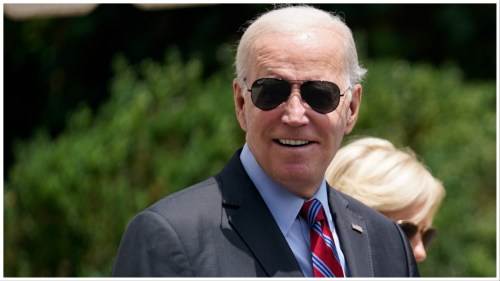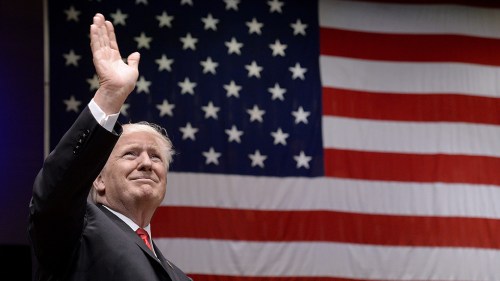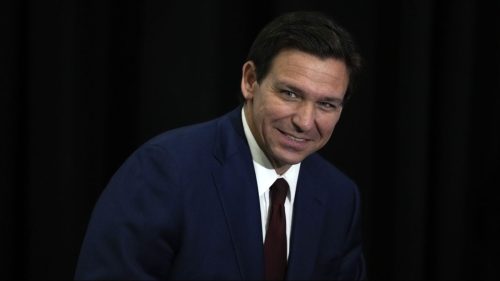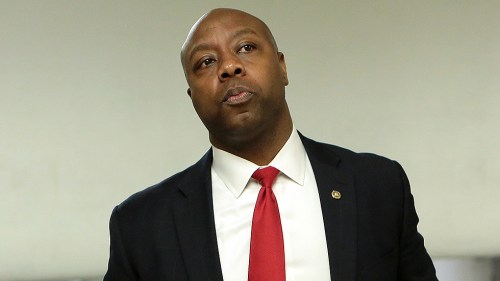Biden makes economic sales pitch as campaign ramps up

The Biden administration sought to flip the script on the economy this week, touting major investments and key endorsements on the back of more surprisingly strong economic data.
While new polling shows that Americans’ views of economic conditions are improving, they’re mostly in negative territory and a serious source of frustration for an administration that wants people to believe in an unequivocal economic success story.
Visiting Wisconsin this week to tout his infrastructure law, President Biden laughed at economists who were erroneously certain that the U.S. economy would fall into a recession over the course of 2023, which did not happen.
“Experts, from the time I got elected, were insisting that a recession was just around the corner. Every month, there was going to be a recession,” Biden said, chuckling as he read this week’s whizzbang headlines about 3.3-percent annualized gross domestic product (GDP) growth during the fourth quarter.
That number followed 4.9 percent growth in the third quarter, another large upside surprise during a period when the consensus among economists — and even the Federal Reserve — was that the U.S. would be in a contraction.
Biden also rode the wave of pro-union sentiment this week that has carried over from the so-called “summer of strikes,” during which labor actions across several high-profile industries during a period of elevated inflation resulted in contractual wins for workers.
“I was so damn proud to stand on that picket line with you,” Biden told United Auto Workers (UAW) at a union event in Washington on Wednesday, receiving a presidential endorsement from UAW President Shawn Fain, who re-energized the union and developed new strike tactics during its most recent work stoppage against automakers Ford, General Motors and Stellantis.
Biden was the first sitting president to join a picket line in U.S. history, according to the AFL-CIO union federation. Americans’ approval rating of labor unions hit its highest level in nearly 60 years in 2022, according to polling agency Gallup.
Biden has sought to capitalize on that trend, commissioning a broadly positive Treasury Department report published last summer on the economic effects unionization and their role in the formation of the U.S. middle class. He has also pledged to be the “most pro-union president” in history and has won praise from labor unions for his efforts to invigorate the National Labor Relations Board (NLRB).
Treasury Secretary Janet Yellen was also singing the economy’s praises this week, noting favorable trends in overall growth, consistently low unemployment, falling inflation, and improving consumer sentiment, which has made large leaps in recent months.
Yellen hammered home the administration’s pandemic response marked by significant amounts of stimulus.
“Put simply, it’s been the fairest recovery on record,” she said in a speech on Thursday. “We see this in gains not only for middle-class Americans but also across demographic groups, such as the rapid decline in unemployment rates for Black and Hispanic Americans.”
Biden and Yellen’s sales push comes days after former President Trump scored a runaway victory in the New Hampshire Republican primary over former U.N. Ambassdor Nikki Haley.
While Haley has vowed to stay in the GOP nomination race, both Biden and Trump’s camps have pivoted toward their likely rematch in November.
How Americans feel about the economy by then could play a crucial role in whether Biden or Trump wins.
Trump predicted earlier this month that the economy would crash sometime within the next 12 months and that he hoped it would so under Biden, lest the former president wear the stain of millions of job losses.
But other Republicans have conceded that the economy is doing very well, according to standard econometric measurements.
Larry Kudlow, director of the White House National Economic Council under former President Trump, said Thursday he’d be bragging about the status of the economy, too, if he were president.
“[Biden] got a good 3.3-percent GDP number for the fourth quarter, following a good 4.9 percent in the third quarter. OK, If I were he, I would be bragging about it, too. And inflation has come down,” Kudlow said on his Fox Business Network television show Thursday.
Inflation has fallen from a nearly 9-percent annual rate in mid-2022 down to 3.3 percent in December. “Core” inflation — which exempts the volatile categories of energy and food — as measured by the personal consumption expenditures (PCE) price index fell to 2.9 percent in December, close to the Federal Reserve’s 2 percent target range.
Despite the positive measurements, polling on Biden’s handling of the economy has not been good, though it is starting to show some signs of improvement.
Positive views of the American economy among Democrats are up to 44 percent from 31 percent a year ago, and they’re up to 13 percent from 12 percent among Republicans, according to polling released this week by the Pew Research Center.
The share of Americans who think economic conditions will be worse a year from now dropped from 46 percent in April of last year to 33 percent today, Pew reported.
However, impressions of the economy are still far less positive than they were before the pandemic, when 57 percent of Americans thought they were good or excellent.
In the face of so much positive data, both the Biden administration and numerous market commentators have scratched their heads and even expressed anger about why Americans aren’t feeling as good about the economy as the data suggests they should be.
While core inflation has fallen and wage growth has broadly kept pace with price growth, the level of prices in many key sectors of the economy is still way higher than it was before the pandemic.
Since February 2020, food prices are up about 25 percent, gas prices are up about 25 percent, and rent is up about 21 percent. Food, rent and gas represent the bulk of expenses for many U.S. households. Over the same period, wages have increased by 20 percent.
Similarly, mortgage rates have shot through the roof since the pandemic, rising from around 3.3 percent to more than 6.7 percent
Another reason for the disconnect may be that even though profits have outperformed expectations, they are not distributed evenly across the economy.
Only a fifth of American households receive income in the form of dividends, interest and rent, according to the Census Bureau. Only 58 percent of U.S. households own any stock at all, according to the Federal Reserve, and more than half of all corporate equities and mutual funds are owned by the top 1 percent of richest households.
Senate Banking Committee ranking member Tim Scott (R-S.C.), who unsuccessfully ran for the GOP presidential nomination this year, acknowledged that access to profits can be limited during a hearing on Wall Street oversight last month.
“If you want to actually experience wealth in America, you have to experience the benefits of profit or equity. Equity comes from having capital — having capital typically means you either have it because you are born with it or you have access to it because you have an idea or a vision that will make your community or this nation better,” he said.
While praising the administration’s economic record this week, Yellen acknowledged that wages, which are the dominant source of income over profits for many Americans, have stagnated as a longer term trend in the economy.
“Real median wages stagnated over decades,” she said Thursday. “They grew only 8 percent between 1979 and 2019. At the age of 30, 90 percent of my generation were earning more than their parents at the same age. In contrast, only half of children born in the mid-1980s earned more.”
“The President and I understand that many Americans have long felt a deeper pessimism about the economy, going back far before the pandemic,” she said. “Due to the longer-term trends that I described, life is still harder than it should be for the middle class in this country.”
Copyright 2023 Nexstar Media Inc. All rights reserved. This material may not be published, broadcast, rewritten, or redistributed. Regular the hill posts












